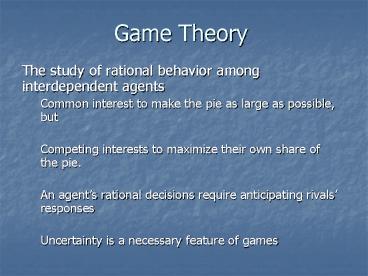Game Theory - PowerPoint PPT Presentation
1 / 27
Title:
Game Theory
Description:
Russian Conductor studying Tchaikovsky score on the train to Minsk ... If Conductor commits to 'Don't Confess', Tchaikovsky has an incentive to confess ... – PowerPoint PPT presentation
Number of Views:49
Avg rating:3.0/5.0
Title: Game Theory
1
Game Theory
- The study of rational behavior among
interdependent agents - Common interest to make the pie as large as
possible, but - Competing interests to maximize their own share
of the pie. - An agents rational decisions require
anticipating rivals responses - Uncertainty is a necessary feature of games
2
Prisoners Dilemma
- During the Stalinist Era
- Russian Conductor studying Tchaikovsky score on
the train to Minsk - Arrested by the KGB
- Thrown into prison
- For three days, he is told nothing
- .Then
3
Prisoners Dilemma
- We have your friend Tchaikovsky and he is
starting to talk - Should the conductor confess?
4
Prisoners Dilemma Payoff Matrix (C, T)
Tchaikovsky
Confess Dont Confess
Conductor
( -8, -8)
( 0, -15)
Confess
( -15, 0)
Dont Confess
( -1, -1)
5
Prisoners Dilemma Suppose Tchaikovsky confesses
Tchaikovsky
Confess Dont Confess
Conductor
( -8, -8)
( 0, -15)
Confess
( -15, 0)
Dont Confess
( -1, -1)
6
Prisoners Dilemma Suppose Tchaikovsky doesnt
confess
Tchaikovsky
Confess Dont Confess
Conductor
( -8, -8)
( 0, -15)
Confess
( -15, 0)
Dont Confess
( -1, -1)
7
Prisoners Dilemma
- Conclusion
- The Conductor will confess
- And Tchaikovsky?
8
Prisoners Dilemma Suppose Conductor confesses
Tchaikovsky
Confess Dont Confess
Conductor
( -8, -8)
( 0, -15)
Confess
( -15, 0)
Dont Confess
( -1, -1)
9
Prisoners Dilemma Suppose Conductor doesnt
confess
Tchaikovsky
Confess Dont Confess
Conductor
( -8, -8)
( 0, -15)
Confess
( -15, 0)
Dont Confess
( -1, -1)
10
Prisoners Dilemma
- Conclusion
- Tchaikovsky confesses also
- Both get 8 years
- Could get off with one year each if they
cooperated - For both, confession is a dominant strategy a
strategy that yields a better outcome regardless
of the opponents choice
11
Equilibrium
- Nash Equilibrium Neither player has an
incentive to change strategy, given the other
players choice - Both confess is a Nash Equilibrium
- Both dont confess is not a Nash Equilibrium,
rival will always want to renege - Noncooperative equilibrium in the Prisoners
dilemma results in a solution that is not the
best possible outcome for the parties.
12
Go Back to Prisoners Dilemma What would the
Conductor and Tchaikovsky decide if they could
negotiate?
- They could both become better off if they reached
the cooperative solution. - which is why police interrogate suspects in
separate rooms.
13
Go back to Prisoners DilemmaIs there a way to
generate the cooperative solution?
Tchaikovsky
Confess Dont Confess
Conductor
( -8, -8)
( 0, -15)
Confess
( -15, 0)
Dont Confess
( -1, -1)
14
Go back to Prisoners DilemmaIs there a way to
generate the cooperative solution?
- Not a Nash Equilibrium
- If Conductor commits to Dont Confess,
Tchaikovsky has an incentive to confess - If Tchaikovsky commits to Dont Confess,
Conductor has an incentive to confess - Role of a contractto commit parties to actions
they would not undertake voluntarily
15
Economic Application Duopoly Game(?A, ?B)
Firm B
Cheat Collude
Firm A
( 100, 100)
( 250, 50)
Cheat
( 50, 250)
Collude
( 200, 200)
16
Duopoly Game
- Nash equilibrium Both Cheat
- Both Cheating means we get closer to the social
optimum
17
Dominant Firm Game
- Two firms, one large and one small
- Either firm can announce an output level (lead)
or else wait to see what the rival does and then
produce an amount that does not saturate the
market. - Numbers are firm profit
18
Dominant Firm Game
Dominant
Lead Follow
Subordinate
( 0.5, 4)
( 3, 2)
Lead
( 1, 8)
Follow
( 0.5, 1)
19
Dominant Firm Game Subordinate Leads
Dominant
Lead Follow
Subordinate
( 0.5, 4)
( 3, 2)
Lead
( 1, 8)
Follow
( 0.5, 1)
20
Dominant Firm Game Subordinate Follows
Dominant
Lead Follow
Subordinate
( 0.5, 4)
( 3, 2)
Lead
( 1, 8)
Follow
( 0.5, 1)
21
Dominant Firm Game
- Conclusion
- Dominant Firm will always lead..
- But what about the Subordinate firm?
22
Dominant Firm Game Dominant Follows
Dominant
Lead Follow
Subordinate
( 0.5, 4)
( 3, 2)
Lead
( 1, 8)
Follow
( 0.5, 1)
23
Dominant Firm Game Dominant Leads
Dominant
Lead Follow
Subordinate
( 0.5, 4)
( 3, 2)
Lead
( 1, 8)
Follow
( 0.5, 1)
24
Dominant Firm Game
- Conclusion
- No dominant strategy for the Subordinate firm.
- Does this mean we cannot predict what they will
do?
25
Dominant Firm Always Leads
Dominant
Lead Follow
Subordinate
( 0.5, 4)
( 3, 2)
Lead
( 1, 8)
Follow
( 0.5, 1)
26
Dominant Firm Game
- Conclusion
- Subordinate firm will always follow, because
dominant firm will always lead.
27
Equilibrium
- Nash Equilibrium Neither player has an
incentive to change strategy, given the other
players choice - Dominant Lead Subordinate Follow is a Nash
Equilibrium - A players best option may be dictated by
anticipating the rivals best option































